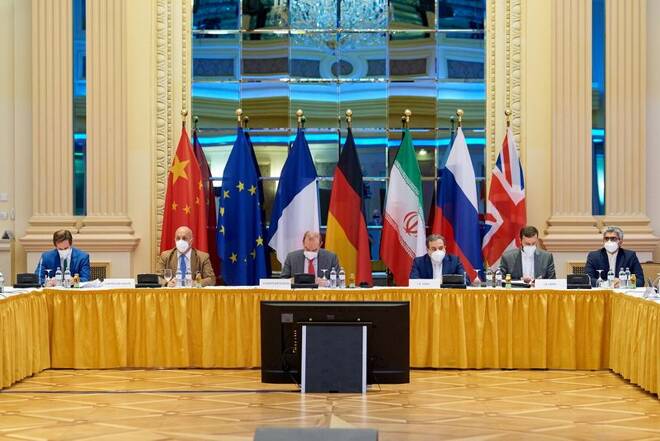Advertisement
Advertisement
U.S. reluctance to lift all Iran sanctions main hurdle to reviving 2015 pact- Iranian official
By:
DUBAI (Reuters) - The reluctance of the United Sates to lift all sanctions on Iran is the main challenge to reviving the 2015 nuclear pact, a senior Iranian foreign ministry official was cited as saying by Iranian media on Sunday.
By Parisa Hafezi and John Irish
DUBAI (Reuters) -The reluctance of the United States to lift all sanctions on Iran is the main challenge to reviving a 2015 nuclear pact, a senior Iranian official said on Sunday, as Western powers questioned Tehran’s determination to salvage the agreement.
Indirect talks between Washington and Tehran on reinstating their nuclear pact broke off on Friday, with both sides saying they would resume the following week, as Western officials voiced dismay at sweeping demands by the Islamic Republic.
“It is now clear that Washington’s reluctance to give up sanctions altogether is the main challenge to the progress of the talks,” the unnamed official was quoted as saying by Iran’s Tasnim news agency.
“We believe that a deal is within reach if the U.S. government gives up its campaign of maximum pressure and the European parties show serious flexibility and political will in the talks.”
Iran and major powers started talks in April aimed at bringing back Tehran and Washington into full compliance with the pact, which was abandoned by former U.S. President Donald Trump three years ago.
But the talks stopped after the election of Iran’s hardline President Ebrahim Raisi in June.
A year after Trump’s reimposition of harsh sanctions on Iran, Tehran began to gradually violate nuclear limits of the agreement. Iran wants all sanctions imposed by the United States to be lifted in a verifiable process.
While stressing that the United States still wanted to revive the deal, under which Iran had limited its nuclear program in return for relief from economic sanctions, a senior U.S. State Department official said on Saturday time was running short.
Iran’s chief nuclear negotiator Ali Bagheri Kani said on Monday that Tehran had delivered two draft proposals to the remaining parties to the deal in Vienna, one on sanctions removal and the other on nuclear limitations.
Tehran said it will later provide a third draft proposal on the “mechanism and time of verification and issues related to receiving guarantees to prevent the re-withdrawal of the U.S. from the nuclear deal”.
Speaking at the Reuters Next conference, U.S. Secretary of State Antony Blinken said on Friday that the United States would not let Iran drag out the process while continuing to advance its program and that Washington will pursue other options if diplomacy fails.
“Contrary to the remarks of the American officials, I believe that if other parties have good will, and stop their futile blame game, an agreement is within reach,” the Iranian official said, according to Tasnim.
“Other parties should provide proper response or present new proposals and clear ideas in writing … Then, ways will be opened for the conclusion of a deal and settlement of differences.”
(Writing by John Irish and Parisa HafeziEditing by Raissa Kasolowsky)
About the Author
Reuterscontributor
Reuters, the news and media division of Thomson Reuters, is the world’s largest international multimedia news provider reaching more than one billion people every day. Reuters provides trusted business, financial, national, and international news to professionals via Thomson Reuters desktops, the world's media organizations, and directly to consumers at Reuters.com and via Reuters TV. Learn more about Thomson Reuters products:
Latest news and analysis
Advertisement
